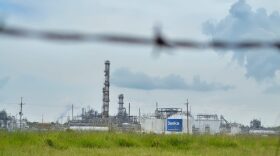-
The practice is called community, citizen or participatory science, and it involves data collected from non-scientists that’s passed along to researchers who use their expertise to study and understand what they mean
-
A new study from Johns Hopkins University measured 17 cancer-causing air pollutants across four parishes between Baton Rouge and New Orleans in 2023.
-
After a proclamation from President Donald Trump, two facilities located in LaPlace, Louisiana will be allowed to ignore federal regulations meant to curb harmful pollutants.
-
It’s a type of plan that environmentalists, scientists and the U.S. Environmental Protection Agency (EPA) says can be a useful tool. But whether the program is fully set up for success isn’t yet certain.
-
Sunrise Foods released air-quality assessments scant in detail. But early last month, LDEQ accelerated the company’s approval for its air-permit application.
-
Community groups are suing the Louisiana Department of Environmental Quality over a new law that could prevent them from publicly sharing their air monitoring data.
-
Residents fighting against pollution from a nearby petrochemical plant are both relieved and disappointed after it suspended production.
-
A former EPA official warns exemption for some coal-fired power plants could be the first step toward gutting pollution rules for all plants.
-
People living in Louisiana’s petrochemical corridor say they’re worried about air pollution under the Trump administration. The EPA says companies can request presidential exemptions from Clean Air Act rules.
-
Residents of the mostly Black communities sandwiched between chemical plants along the lower Mississippi River have long said they get most of the pollution but few of the jobs produced by the region’s vast petrochemical industry.

Play Live Radio
Next Up:
0:00
0:00
Available On Air Stations









